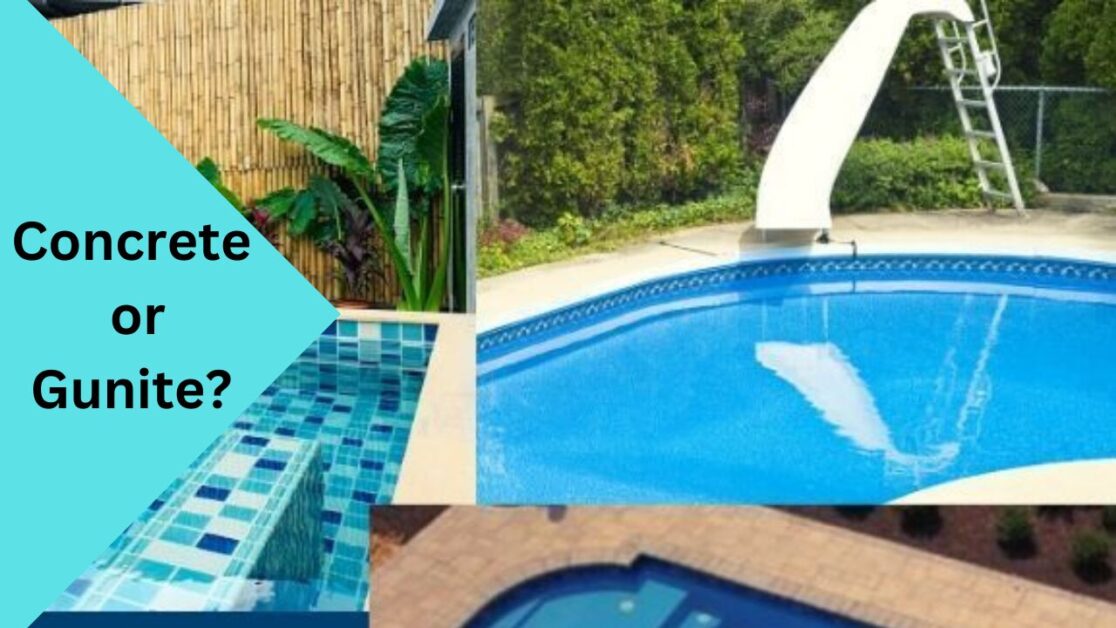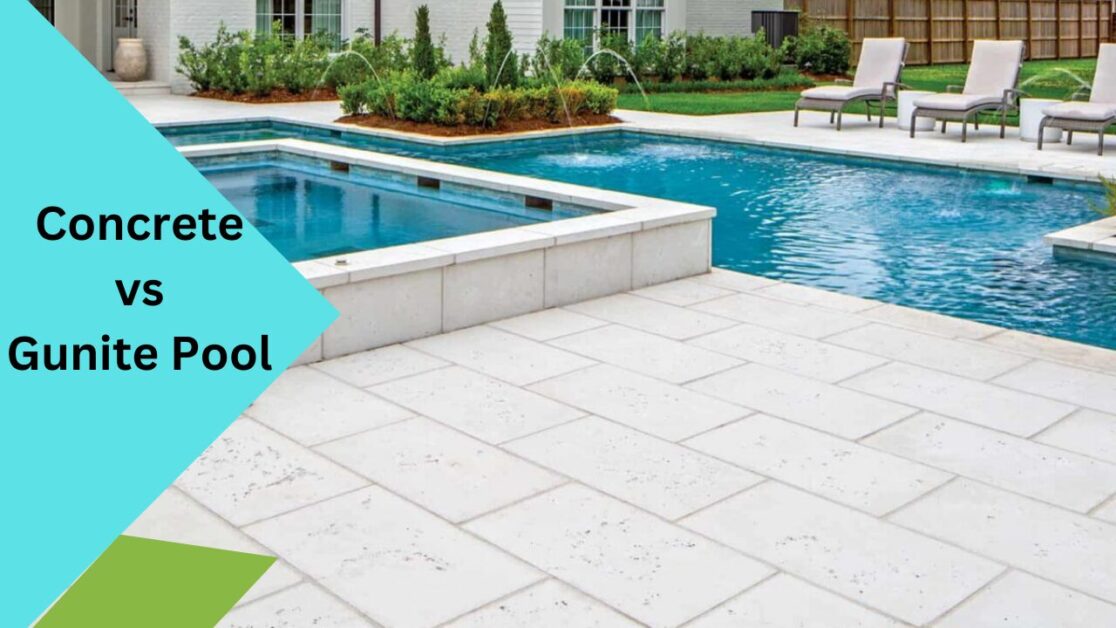Are you dreaming of transforming your backyard into a beautiful oasis with a swimming pool? When it comes to choosing the type of pool that suits your needs, the decision between a concrete pool and a gunite pool often arises. In this blog post, we will explore the similarities and differences between concrete and gunite pools to help you make an informed choice. Whether you’re curious about their composition, longevity, or maintenance requirements, we’ve got you covered. Let’s dive into the world of concrete and gunite pools!
Understanding Concrete and Gunite Pools
Before we dive into the details, let’s clarify what concrete and gunite pools actually are. While they are often used interchangeably, there are subtle distinctions between the two.
Concrete pools refer to swimming pools constructed using poured concrete, which is a mixture of cement, aggregate, and water. The concrete is typically reinforced with steel bars or mesh to enhance its strength and durability. On the other hand, gunite pools are a specific type of concrete pool. Gunite is a dry mix of sand and cement that is combined with water at the construction site before being sprayed onto a reinforced framework of steel rods or mesh. Both concrete and gunite pools offer exceptional flexibility in terms of shape, size, and design customization.To explore more details and considerations regarding Gunite Pool, our comprehensive guide on What Are Gunite Pools – Unveiling the Wonders has you covered.
Similarities Between Concrete and Gunite Pools
When it comes to similarities, concrete and gunite pools share several common characteristics that make them popular among homeowners seeking a long-lasting and customizable pool solution:
- Durability: Both concrete and gunite pools are renowned for their durability and longevity. With proper maintenance and care, they can last for several decades, providing endless joy and relaxation.
- Customization: Whether you envision a sleek geometric design or a free-flowing natural shape, both concrete and gunite pools offer unparalleled flexibility in terms of shape, size, and design customization. You can create the pool of your dreams that perfectly complements your backyard landscape.
- Versatility: Concrete and gunite pools can be outfitted with various features and accessories such as waterfalls, slides, hot tubs, and lighting. This versatility allows you to personalize your pool, transforming it into a true backyard paradise.
- Investment Value: Investing in a concrete or gunite pool can greatly enhance the value of your property. These pools are seen as attractive features that can entice potential buyers, thereby increasing the overall market value of your home.
What Sets Gunite Pools Apart from Concrete Pools?
While concrete and gunite pools share many similarities, there are some key distinctions that set gunite pools apart:
- Construction Process: Gunite pools have a unique construction process that involves spraying a dry mix of sand and cement onto the reinforced framework. This allows for more control and precision during the construction process, resulting in a smoother and more uniform finish compared to traditional poured concrete pools.
- Design Versatility: Gunite pools offer even greater design versatility than traditional poured concrete pools. The ability to shape gunite on-site allows for more intricate and custom designs, making it easier to create unique features such as beach entries, tanning ledges, and negative edges.
- Smooth Surface: The nature of the gunite application process results in a smooth surface that feels comfortable underfoot. This smoothness not only enhances the swimming experience but also makes cleaning and maintenance easier compared to rougher finishes commonly found in some poured concrete pools.
- Superior Strength: Gunite pools are renowned for their strength and structural integrity. The combination of steel reinforcement and the high-density gunite material ensures that these pools are capable of withstanding extreme weather conditions, ground movement, and potential hydrostatic pressure.
- Expense: It’s worth noting that gunite pools can sometimes be more expensive to construct compared to traditional poured concrete pools. The intricate construction process and the level of customization available can contribute to higher upfront costs. However, considering their durability and long lifespan, gunite pools are often considered a worthwhile investment in the long run.
Is Gunite Pool Better Than Concrete?
The debate about whether a gunite pool is better than a traditional poured concrete pool ultimately comes down to personal preferences and priorities. Let’s evaluate the various factors to help you make an informed decision:
- Design Flexibility: If you desire a pool with unique shapes, custom features, and intricate designs, gunite pools offer unparalleled design flexibility. The ability to shape gunite on-site allows for endless possibilities, ensuring your pool is a one-of-a-kind masterpiece.
- Smooth Surface and Comfort: Gunite pools generally have a smoother surface compared to some poured concrete pools. This smoothness provides a more comfortable swimming experience and is also easier to clean and maintain.
- Longevity and Strength: Both gunite and poured concrete pools are highly durable and can last for several decades with proper maintenance. However, gunite pools are often considered to be slightly stronger due to their unique construction process and the high-density gunite material used.
- Expense: It’s important to consider the cost factor when deciding between a gunite pool and a concrete pool. Gunite pools can be more expensive upfront due to the additional customization options and the intricate construction process involved. However, if budget allows, the long-term benefits and aesthetic appeal of a gunite pool often outweigh the initial investment.
In conclusion, there isn’t a definitive answer as to whether a gunite pool is better than a concrete pool. It largely depends on your specific requirements, preferences, and budget. If you prioritize design flexibility, a smooth surface, and are willing to invest in a custom pool that will stand the test of time, a gunite pool may be the perfect choice for you.
Disadvantages of a Gunite Pool
While gunite pools offer numerous advantages, it’s essential to also consider their potential downsides. Here are a few disadvantages to be aware of:
- Higher Initial Cost: Gunite pools generally have higher upfront costs compared to other types of pools. The extensive customization options, intricate construction process, and specialized labor contribute to this higher price tag.
- Longer Construction Time: Due to the complex construction process, gunite pools often require more time to build compared to other types of pools. This extended construction period can be a drawback if you are looking for a quick pool installation.
- Regular Maintenance: Like any pool, gunite pools require regular maintenance to ensure their longevity and keep them in pristine condition. The smooth finish of gunite pools may show stains and wear more easily, requiring periodic cleaning and refinishing.
- Potential Cracking: While gunite pools are known for their strength, it’s important to note that they are not entirely immune to cracking. Factors such as ground movement and extreme climate conditions can potentially cause cracks in the pool structure. However, with proper construction techniques and regular inspections, the risk of cracking can be minimized.
By understanding these potential disadvantages, you can make an informed decision and take the necessary steps to mitigate any concerns related to owning a gunite pool.
Life Expectancy of a Gunite Pool
When it comes to the lifespan of a gunite pool, proper construction, regular maintenance, and responsible use play crucial roles. On average, a well-maintained gunite pool can last for several decades. In fact, some gunite pools have been known to last for over 50 years!
To maximize the lifespan of your gunite pool, it’s important to adhere to the following practices:To explore more details and considerations regarding Gunite Pool life, our comprehensive guide on How Long Do Gunite Pools Really Last? Unveiling the Truth has you covered.
- Routine Maintenance: Regularly cleaning, brushing, and vacuuming your pool is essential to prevent the buildup of algae, debris, and stains. Additionally, maintaining proper water chemistry by regularly testing and balancing the pool water helps prevent damage to the pool surface and equipment.
- Inspection and Repair: Conducting regular inspections, at least once a year, allows you to identify any signs of wear and tear or potential issues that may require repair. Promptly addressing any repairs or maintenance needs can significantly extend the life of your gunite pool.
- Responsible Use: Avoid excessive use of chemicals and be cautious with heavy objects in the pool, as these can potentially damage the gunite surface over time. Additionally, taking care when using pool cleaning equipment and avoiding sharp or abrasive tools can help prevent unnecessary wear and tear.
By implementing these practices, you can ensure that your gunite pool remains beautiful, functional, and enjoyable for many years to come.
How to Determine if Your Pool is Concrete or Gunite?

If you’re unsure of whether your pool is made of concrete or gunite, there are a few methods you can use to determine the pool’s construction material:
- Visual Inspection: Start by visually examining the pool’s interior. Look closely at the surface of the pool walls and floor. Gunite pools usually have a smooth finish, while poured concrete pools may appear more rough or textured.
- Tap Test: Gently tap the side of the pool with your knuckles or a small mallet. If you hear a hollow sound, it is likely a gunite pool. In contrast, a solid sound may indicate a poured concrete pool.
- Consult a Professional: If you’re still unsure, it’s best to consult a pool professional or contractor who can provide a definitive answer based on their expertise and experience.
Determining whether your pool is concrete or gunite can be helpful for maintenance and future renovation purposes. If you require any specific repairs or updates, knowing the pool’s construction material will aid in choosing the appropriate solutions.
Conclusion
When it comes to selecting between a concrete pool and a gunite pool, there are many factors to consider. While both offer durability, customization, and investment value, gunite pools provide unparalleled design flexibility, a smoother surface, and strength. However, they may come with a higher initial cost and longer construction time.
It’s important to carefully evaluate your preferences, budget, and long-term goals before making a decision. Whether you choose a concrete pool or a gunite pool, remember to prioritize routine maintenance and responsible use to ensure the longevity of your backyard oasis.

Greetings, fellow pool enthusiasts! I’m Turner Davis, your dedicated guide to the world of pool care and maintenance. With over a decade of experience in the field, I’ve made it my mission to transform ordinary pools into extraordinary aquatic retreats.

